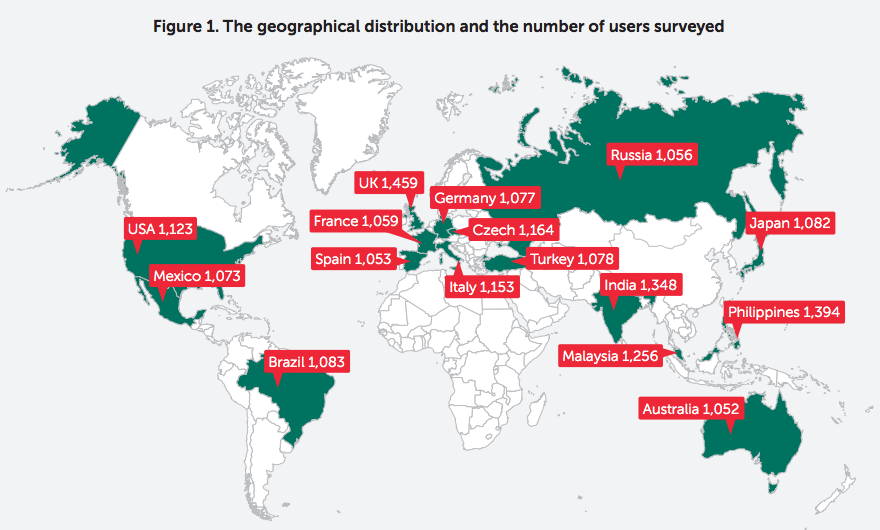
The global study of Kaspersky Lab had 18,000 respondents from 16 countries with 1,394 coming from the Philippines. Graphics from the Kaspersky Lab report.
A global study by an international cybersecurity company on the habits of social media users has found that a large number are easy targets for hackers or cybercriminals.
“Not everyone knows the rules of safe online behavior,” Kaspersky Lab said in its report following a survey of more than 18,000 users from 16 countries. Philippines had the second highest number of respondents with 1,394.
BACKSTORY: Many social network users easy prey for cybercriminals
“Our inability to recognize a potential Internet threat may lead to consequences that are as unpleasant as in the real world – the loss of money or valuable things, an interference with privacy, etc.” the report said.
To protect social media accounts from being hacked, Kaspersky Lab gave seven tips that will help secure the social media accounts of the 47 million Facebook users in the Philippines.
- Verify every Facebook contact.
- Make sure that the person you’re talking to… really is the person you think they are. Try to verify their identity.
- Protect your banking and financial information by not disclosing anything about your bank accounts, credit cards, debit cards, or other financial information on Facebook.
- In life and in the cyber-world, be wary of strangers that may contact you.
- Don’t add or accept friend requests from people that you don’t know.
- Keep your password secure and never disclose it to anyone.
- Ideally, your password should use a mixture of letters, numbers and symbols. Remember to change your password frequently.
Findings of the Kaspersky study show that many people’s social media habits are vulnerable to exploitation by cybercriminals. Graphics from the Kaspersky Lab report.
“Social networking sites are where we leave information about ourselves — our digital shadow. Once they have cracked a user’s page, cybercriminals get the chance to publish advertisements on his behalf, send malicious links to his friends, or use his personal information for their own purposes,” the Kaspersky report said.
“Each user of a social networking site should be ready for this and follow some simple rules: for example, not add to friends all in a row, not disclose too much personal information and not to click on all links received from his friends,” it said.
Among the other main findings in the study was that only 24 percent of users could tell the difference between original websites and fake ones. Fake websites are used by cybercriminals to steal user information such as usernames and passwords or financial information.
It also found that 34 percent of users would not hesitate to download an attachment from an email even if it was an executable file (.exe format) which is most likely a malicious file sent by a potential hacker.
Findings of the Kaspersky study show that there are still social media users who share information publicly. Graphics from the Kaspersky report.
RELATED STORIES
Maine Mendoza regains control of Twitter account; hackers apologize
Toni, Alex nabiktima ng sindikato sa internet; IG, FB na-hack
Over 1.5M are cybercrime victims daily worldwide–study